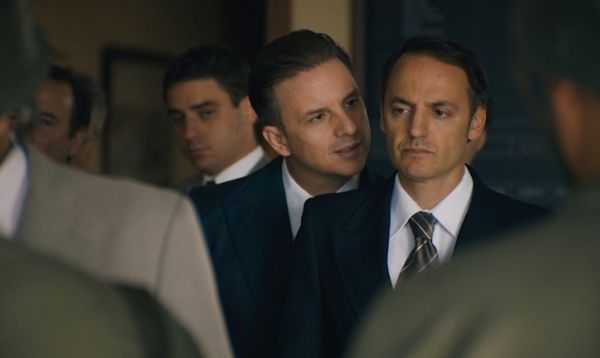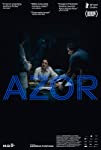Eye For Film >> Movies >> Azor (2021) Film Review
Azor
Reviewed by: Anne-Katrin Titze

Ivan de Wiel (Fabrizio Rongione, a Jean-Pierre Dardenne and Luc Dardenne favourite), private banker from Geneva, Switzerland, arrives in Buenos Aires with his wife Inès (Stéphanie Cléau, seen in Mathieu Amalric’s The Blue Room, their adaptation of Georges Simenon’s novel). A military coup has plunged the country into turmoil. De Wiel is in Argentina to take over the business left behind by his banking partner René Keys (Alain Gegenschatz), who had disappeared without a trace in Andreas Fontana’s haunting Azor, co-written with Mariano Llinas.
1977 in A Book of Common Prayer Joan Didion writes: “The day Luis was shot Elena flew to exile in Geneva, a theatrical gesture but unnecessary, since even before her plane left the runway the coup was over and Little Victor had assumed temporary control of the government.” The characters inhabiting Didion’s invented Central American nation Boca Grande could effortlessly wander over into Fontana’s creation for Azor’s Argentina in 1980, where the world of private banking intertwines with military dictatorship.

Keys is a cypher and it is impossible to get a clear sense of the man de Wiel is to replace. Described as brilliant with toxic exuberance, who may have gone too far, he overshadows any interaction as Ivan plunges deeper and deeper into foreign territory in a foreign land where he will have to come up with his own strategy when visiting client after client. While Inès and Ivan witness brutal arrests on the street upon their arrival, in the private residences, rural palaces, racetracks, and exclusive clubs rather different dangers lurk.
Boredom is seen as “divine punishment,” old money detests new money and vice versa. We, the spectators, are let in to a point to watch, but never long enough to really understand, until we are swatted aside like the horsefly that settles for a second on the wife’s red bathing suit by the pool. “Now they disappear horses,” we overhear. Trees shot from above look like broccoli and a real war of greed has broken out.
The visuals are often breathtakingly beautiful and foreboding, depicting splendour and decay. During a horseback riding scene in the overgrown countryside, the landowner compares the once glorious avenue, now covered up to the horses’ bellies in weeds, to Haussmann’s grands boulevards during his great grandfather’s time. Well-chosen corners of fantastic landscapes and garden-scapes, framed by cinematographer Gabriel Sandru, are juxtaposed with ominous sound design to great effect.
At the private club where Anatole France and the Duke of Windsor were guests, the sounds oscillate between sauna and squash, fencing and torture. How old is the man with the name Adolfo in 1980 and can we deduce anything from that about his family? For Fontana names are a key in the game. A representative of the clergy considers the city in chaos with hundreds of people disappearing as a “purification period.”
The symbolism in the names feels completely organic. The character of René Keys presumably holds the clues to success, while a mysterious Lazaro, written down in his appointment book, promises a return from the dead. It took me a while to figure out the very amusing choice of the family name de Wiel [try pronouncing satan with a French accent] for the protagonists.
Many doors are not very open, they give us merely a little glimpse into a strange world. A particularly impressive scene sets us up to get a wrong idea at first. The de Wiels visit the villa of a wealthy woman. She and Inès speak in French, Ivan and a gentleman speak in Spanish; their dialogues overlap; we think we know what’s going on and we don’t at all. This wonderful double dialogue, Andreas Fontana told me, was the first he wrote for the film.
At a gala, Inès amuses a rich widowed client about the code names in the private banking world. There is one for not meeting someone’s eye, one for playing innocent, one for someone who can’t be trusted. And then there’s Azor, which means be quiet and very careful what you say.
Reviewed on: 30 Dec 2021














